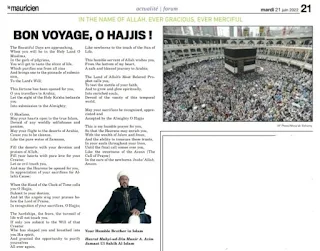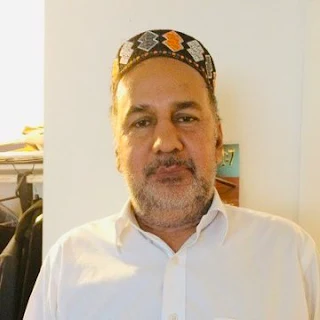Ka’aba is
the first spiritual home of human kind. From Hazrat Adam (as) through Hazrat
Ibrahim (as) and Hazrat Ismail (as), the grand legacy of Tawheed, the
mantle of sublime worshipful practices in utter devotion to the Unique Lord of
the worlds, reached its religious perfection and ethical permanence with the
advent of the Holy Prophet Muhammad (sa) and the establishment of Islam. The
unique history of that ancient spiritual space in Arabia is commemorated,
through the long, thriving spiritual traditions of Tawaf in
Makkah, the great Hajj, as well as Umrah. As the Baitullah is
in the spiritual heart of the Muslim world, the pilgrims flock to the place
from around the world, literally, every day and year.
Indeed, circumambulation at the ancient House of God is emblematic of true spirituality in Islam. In the Islamic tradition, it is recorded that several Adams have performed their Tawaf around the Ka’aba over countless ages. Noble souls, Elects of God in particular, will be eager to perform their Tawaf. Consider the Islamic traditions that preserve glad tidings concerning the advent of Divinely-raised souls to restore Islamic teachings in every era. It is also foretold that such an inspired soul, the Islamic Messiah of the Later Days, will perform Tawaf around Makkah, perform Umrah or Hajj, or both.
By the immense grace
and blessings of Allah, the prophecy about the Islamic Messiah entering Makkah
to perform Tawaf stands literally
fulfilled in our times with the Muhyi-ud-din Al Khalifatullah Hazrat Munir
Ahmad Azim (aba) of Mauritius, accompanied by members of the holy family, performing
Umrah in February 2018, Alhamdulillah, Summa Alhamdulillah.
A
recent, beautiful dream made by Hazrat Saheb (aba) in this blessed month of
Ramadan foretells glad tidings for the Jamaat’s future, especially about the
continuation of the holy trusteeship of the Divine mission, with a future Khalifa along with countless followers also
performing the Tawaf, holding the
keys of the Ka’aba in a mystical or literal way, Insha Allah. The dream of the Khalifatullah (aba) on the 22nd of April 2022 also reminds old members of the Jamaat about a remarkable Kashaf (spiritual visions) made by Hazrat Ummul Mu'mineen Fazli Amena Varsally on 20- 21 April 2018 on the larger theme of preservation of Ka'baa keys- a metaphor for the safeguarding of enduring Islamic teachings as taught by the Holy Prophet (sa). For the spiritual benefit of everyone, the extracts from Jamaat communications sent by Hazrat Tayyeba Shaheeda Aliah Nasrine on the two different occasions, narrating these spiritual experiences, are reproduced below:























